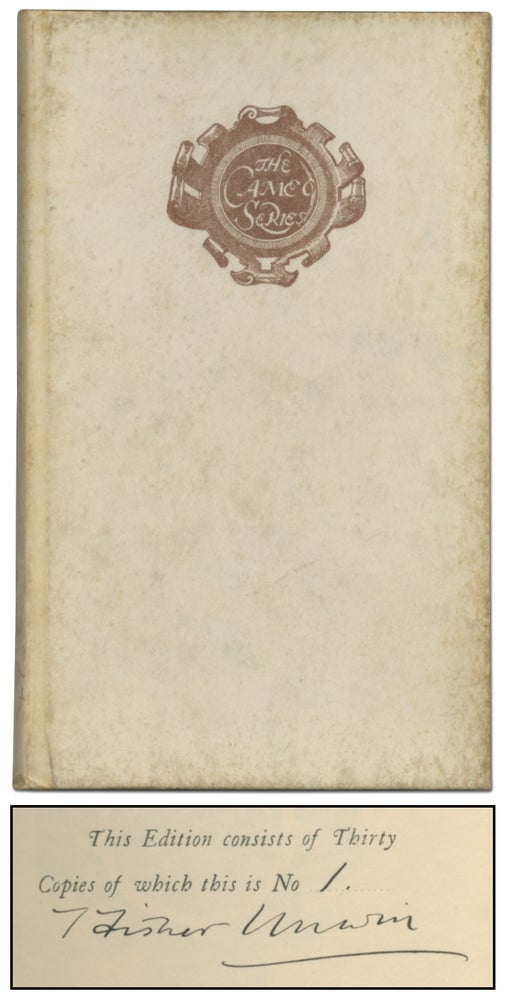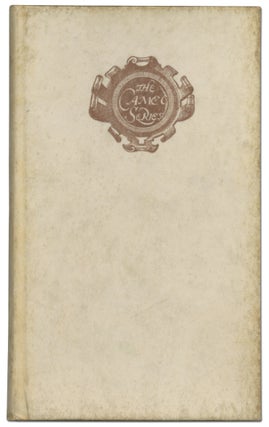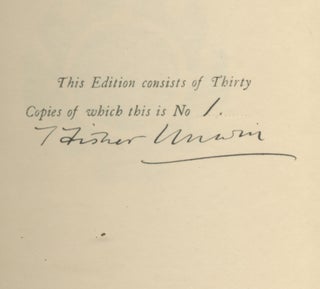London: T. Fisher Unwin, Cameo Series, 1901.
Price: $2,000.00
Hardcover. Second edition (following the 1884 first edition). Parchment boards, spine lettered in gilt. Frontispiece. Vellum leaves. Some light foxing to edges of boards, else a nice copy. Copy number 1 of thirty copies on vellum, specially bound, numbered, and signed by the publisher, whose copy this was. "This volume is a reprint of that issued in 1884, with the addition of a sonnet and a translation, from a volume published in Cambridge in 1881, and now out of print." Loosely inserted are three newspaper cuttings: an obituary of Levy published in the *Daily News* on Sept 14; a poem, "In Memoriam Amy Levy," by Ida J. Lemon, published in *The British Weekly* on Sept 27th, and "verses of an antique Spanish ballad" translated by Vernon Blackburn and published in *The Pall Mall Gazette* on the 26th.
Amy Levy was a remarkably precocious feminist. One of her childhood drawings shows a woman standing on a soap box with a banner reading: "Women’s Suffrage! Man is a Cruel Oppressor!" Reviewing Elizabeth Barrett Browning’s Aurora Leigh for a children’s magazine at the age of thirteen, she criticized the author for including "too many learned allusions" but suggested that "it is only natural that she should wish to display what public opinion denies her sex – a classical education." Four years later, she contributed an article, "Jewish Women and Women’s Rights" to *the Jewish Chronicle*, and she became the second Jewish woman to go to Cambridge. Amongst her later friends were Eleanor Marx, Olive Schreiner, and Vernon Lee, to whom she was particularly drawn. Through her friendship with Lee, she was able to join a circle of female friends amongst whom she could express her sapphic orientation with greater openness.
Much of Levy’s symbolist-inflected verse tends towards melancholy, as did its author. "She was indeed frequently gay and animated," wrote Richard Garnett in the DNB, "but her cheerfulness was but a passing mood that merely gilded her habitual melancholy, without diminishing it by a particle, while sadness grew upon her steadily, in spite of flattering success and the sympathy of affectionate friends." Aside from the habit of despair, she suffered increasingly from deafness and feared that, like her brother, she might go mad. The controversy following publication of her second novel, *Reuben Sachs*, and above all a critical reference of it in *The Jewish Chronicle*, may have exacerbated Levy’s final depression. The paper mentioned it in its review of a pseudonymous novel, published by Fisher Unwin, entitled *Isaac Eller’s Money*: "*Isaac Eller’s *Money* ... is a clever performance in the style of *Reuben Sachs*, but less intentionally offensive... The clever ill-natured fiction of Jewish life has now reached a high level of development." On September 10th 1889, two months short of her 28th birthday, Levy committed suicide. Writing in the *Boston Herald* earlier that year, Louise Chandler Moulton recalled that she had first heard of Amy Levy in the autumn of 1887: "Oscar Wilde had assumed editorship of *The Woman’s World*, and was telling me his plans for the new number, which was to be issued in December of ’87. ‘The most wonderful thing in the number,’ he said, ‘will be a story, one page long, by Amy Levy ... a mere girl, but a girl of genius.'" In his later obituary of her, Wilde wrote: "Miss Levy’s novels *The Romance of a Shop* and *Reuben Sachs* were both published last year. The first is a bright and clever story, full of sparkling touches; the second is a novel that probably no other writer could have produced. Its directness, its uncompromising truths, its depth of feeling, and above all, its absence of any single superfluous word make it, in some sort, a classic.... To write thus at six-and-twenty is given to very few." Amy Levy then fell precipitously off the literary map for almost a century.
Her death certificate recorded the cause of death as "asphyxia from the inhalation of Carbonic Oxide Gas from the burning of charcoal." In an article for *The Boston Pilot*, W.B. Yeats comment: "Literary London was deeply moved by the suicide of the young Jewish novelist and verse writer, Miss Amy Levy. Many will take up with sad interest the posthumous volume, *A London Plane-Tree*, now in the press. I saw her no long while before her death. She was talkative, good-looking in a way and full of the restlessness of the unhappy. Had she cared to live, a future of some note awaited her." Rare.
Item #397569




